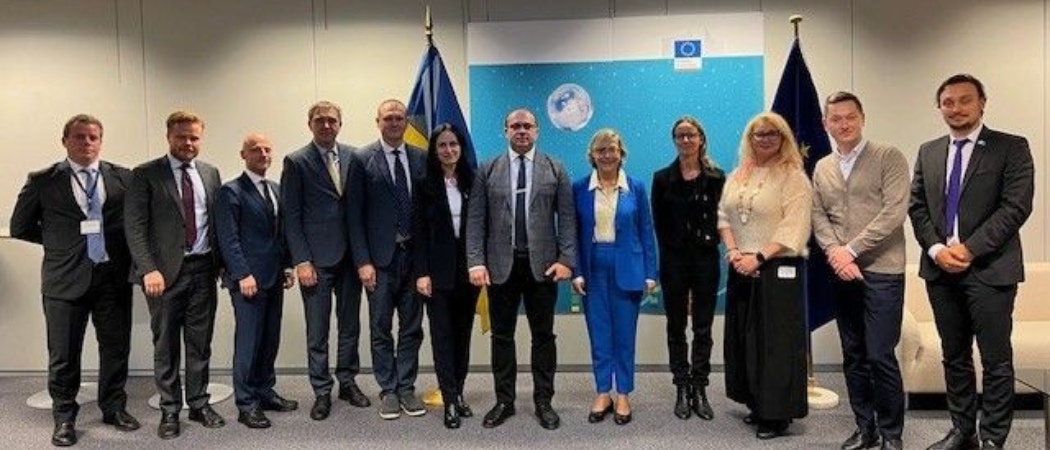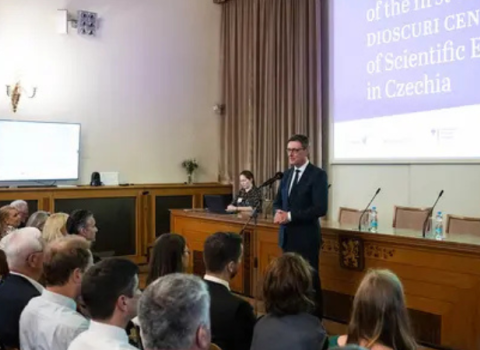Kyiv officials coordinate with Brussels on recovery plan, as international coalition for Ukrainian research and innovation keeps growing

EU and Ukraine delegations at a meeting in Brussels, October 2025. Photo credits: European Commission
Ukraine and the European Commission are working on a “working mechanism” for an international coalition of countries and international organisations willing to help the war-torn country to rebuild its science sector, says Denys Kurbatov, Ukraine’s deputy minister for education and science.
Back in July, the Commission joined Italy, Germany, Poland and other EU countries to launch an international coalition to raise money and pool know-how in order to rebuild Ukraine’s science system, and to put research and innovation at the core of Ukraine’s long-term development.
This coalition “was mainly created in order to consolidate the efforts of different foreign governments and international organisations in order to align their support with Ukrainian needs,” Kurbatov told Science|Business in an interview ahead of his meeting with EU officials in Brussels.
However, the “working mechanism” to deliver on the coalition’s promise was lacking. Now, Ukraine and the Commission are putting together a plan for how the “administrative work will be executed,” Kurbatov said.
The goal is that, by the next conference on Ukraine’s recovery, which will take place in Warsaw in 2026, the coalition agrees on the governance structure and rules according to which aid in cash and in kind would be distributed. So far, 18 countries and organisations have joined the coalition, but Kurbatov hopes that number will go up to 30.
Rebuilding costs
According to Ukrainian government data, the country would more than €1.2 billion to rebuild the research and higher education infrastructure it has lost.
Restoring buildings and buying new research equipment would cost around €1 billion. Another €150 million would be needed for Ukraine to set up a national system for funding 2,000 top young researchers working in science, technology, engineering and mathematics disciplines, who would receive financial support of about €500 per month.
Kurbatov says the €1.2 billion figure is an “approximation” as the list of damages to research infrastructures keep growing. Ukraine is investing money from its own budget to rebuild some of that lost infrastructure, but the national budget “cannot cover all the needs, and that is why we are highly expecting the contribution of the coalition,” he said.
Related articles:
- European leaders cobble together international coalition for Ukrainian science
- Sumy State University sets up international fundraiser to rebuild devastated campus
“Several countries” have already announced their financial contributions through the international coalition for science, totalling around €150 million so far, said Kurbatov.
In addition, the government does not necessarily want to rebuild everything that has been lost to bombings. There are plans to establish completely new labs and facilities adapted to emerging priorities in science and technology.
“We are seeking our own niche, where Ukraine can be really efficient and maybe even create new infrastructures that were not present in Ukraine before the war,” said Kurbatov.
The scope of Ukrainian science is changing and the government is preparing a draft law that would set 15 main priorities, including in defence technologies, but also in energy, environmental protection, healthcare and artificial intelligence. In addition, the government wants to set up six new centres of excellence.
Asked whether the government would wait for the war to be over before it starts rebuilding its research infrastructure, Kurbatov said that, outside regions directly situated on the frontlines, construction can start now. Work on the six centres of excellence would kick off by next year, he added.
“Due to the war there are different safety restrictions in different regions of Ukraine, but in western regions of Ukraine, it is comparably safe, and this is where new infrastructures may be built or renovated,” Kurbatov said.
Human capital
Since Russia’s full-scale invasion in February 2022, 30% of Ukraine’s research institutions have been destroyed and 20% of researchers have been displaced. Those who remained in the country are facing severe funding shortages and are working in inadequate facilities in challenging conditions.
The government is planning to launch a new funding scheme aimed at selecting 1,000 of the best Ukrainian scientists for financial support from 2026 onwards.
“We understand that we need special programmes to support researchers,” said Kurbatov. “Our main aim is to show for those researchers that it is worth continuing their work in Ukraine.”





 A unique international forum for public research organisations and companies to connect their external engagement with strategic interests around their R&D system.
A unique international forum for public research organisations and companies to connect their external engagement with strategic interests around their R&D system.